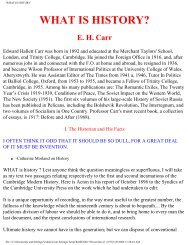The bronze age and the Celtic world - Universal History Library
The bronze age and the Celtic world - Universal History Library
The bronze age and the Celtic world - Universal History Library
Create successful ePaper yourself
Turn your PDF publications into a flip-book with our unique Google optimized e-Paper software.
36 THE BRONZE AGE AND THE CELTIC WORLD<br />
over most parts of Europe which were not too remote from <strong>the</strong> sea to be affected by<br />
sea-borne commerce. Thus a considerable minghng of peoples <strong>and</strong> cultures took<br />
place, not by <strong>the</strong> sudden arrival of large numbers of invading hordes, but by <strong>the</strong><br />
constant infiltration of small bodies of merchants <strong>and</strong> seamen.<br />
<strong>The</strong> origin of <strong>the</strong> discovery of metal is still unknown, though many ingenious<br />
suggestions have been made. All investigators are agreed that gold, being <strong>the</strong> most<br />
strikingly conspicuous metal, was <strong>the</strong> first to be noticed <strong>and</strong> used, though <strong>the</strong>re are<br />
those who beheve that copper was almost if not quite as early a discovery. Professor<br />
Elliot Smith has made interesting suggestions in both cases. He beheves that<br />
somewhere on <strong>the</strong> African shore of <strong>the</strong> Red Sea a cult arose which involved <strong>the</strong> use<br />
of <strong>the</strong> cowry shell as an amulet for fertility ; such cults are well-known <strong>and</strong> widely<br />
spread.' For some reason <strong>the</strong> shells did not ultimately satisfy <strong>the</strong> people, or <strong>the</strong><br />
supply diminished, <strong>and</strong> <strong>the</strong>y made models in gold, deposits of which were found in that<br />
locahty. Thus <strong>the</strong> virtue of <strong>the</strong> amulet, residing originally in its form, became<br />
transferred to <strong>the</strong> material, <strong>and</strong> gold became <strong>and</strong> has since remained a lucky <strong>and</strong><br />
fortunate possession.*<br />
Copper, on <strong>the</strong> o<strong>the</strong>r h<strong>and</strong>, he believes to have been discovered in Egypt. <strong>The</strong><br />
inhabitants of this country had, in neolithic days, been in <strong>the</strong> habit of mining malachite<br />
in <strong>the</strong> Sinaitic peninsula, <strong>and</strong> grinding this mineral on slate palates into a powder, which<br />
<strong>the</strong>y apphed to <strong>the</strong>ir eyes. Green powder thus applied is said to save <strong>the</strong> wearer from<br />
<strong>the</strong> ill-effects of glaring sunUght, <strong>and</strong> perhaps served also to keep away <strong>the</strong> flies, which<br />
are a constant source of ophthalmia. Professor Elliot Smith suggests that an<br />
Eygptian, grinding his lump of malachite on his decorated slate palate, one day met<br />
with an unusually hard lump, which he could not grind satisfactorily. In a fit of<br />
temper he threw <strong>the</strong> offending morsel into <strong>the</strong> fire, doubtless with words of objurgation ;<br />
later on in <strong>the</strong> ashes he found a small red bead of copper. A repetition of this action,<br />
no doubt with <strong>the</strong> same formula, produced an identical result, <strong>and</strong> so <strong>the</strong> discovery of <strong>the</strong><br />
reduction of copper from its ore was made.^ I must admit that at one time I doubted<br />
<strong>the</strong> possibility of this explanation, as I questioned whe<strong>the</strong>r <strong>the</strong> heat of a fire of dung,<br />
5 Smith, G. Elliot (1919) 143, 150-153.<br />
' Smith, G. Elliot (1919) 221-225.<br />
7 Smith, G. Elliot (191 1) 4.







